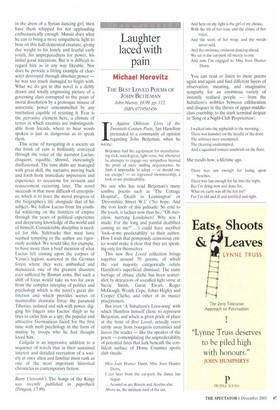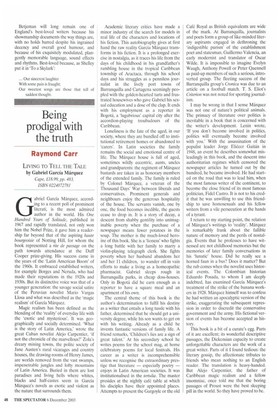Laughter laced with pain
Michael Horowitz
THE BEST LOVED POEMS OF JOHN BETJEMAN John Murray, £8.99, pp. 112. ISBN 0719565456 In Against Oblivion: Lives of the Twentieth-Century Poets, Ian Hamilton pretended to a community of opinion regarding John Betjeman, when he wrote: Betjeman had the equipment for manufacturing slick, sociological, light verse, but whenever he attempts to engage our sympathies beyond the point of mere smiling acquiescence, he finds it impossible to adapt — or should one say escape? — an ingrained showmanship, a look-at-me predictability.
No one who has read Betjeman's many sombre poems such as 'The Cottage Hospital', 'Death in Leamington' or 'Devonshire Street W.1' (No hope. And the iron knob of this palisade/ So cold to the touch, is luckier now than he./ "Oh merciless. hurrying Londoners! Why was I made/ For the long and painful deathbed coming to me?"...') could have ascribed look-at-me predictability' to their author. How I wish that pompously censorious critics would make it clear that they are speaking only for themselves.
This new Best Loved collection brings together around 70 poems, of which the vast majority categorically refute Hamilton's superficial dismissal. The same barrage of obtuse cliché has been scattershot by detractors of so-called light verse at Stevie Smith, Gavin Ewart, Roger McGough, Wendy Cope, Johns Hegley and Cooper Clarke, and other of its master practitioners.
But even 'A Subaltern's Love-song' with which Hamlton himself chose to represent Betjeman, and which is given pride of place at the front of Best Loved, actually veers subtly away from bourgeois certainties and leaves the reader — like the speaker of the poem — contemplating the unpredictability of potential fates that lurk beneath the confident surface of Home Counties sports club rituals: And here on my right is the girl of my choice, With the tilt of her nose and the chime of her voice, And the scent of her wrap, and the words never said, And the ominous, ominous dancing ahead. We sat in the car-park till twenty to one And now I'm engaged to Miss Joan Hunter Dunn.
You can read or listen to these poems again and again and find different layers of observation, meaning, and imaginative sympathy for an enormous variety of instantly realised people — from the Subaltern's wobbles between exhilaration and disquiet in the throes of upper-middleclass courtship, to the stark terminal despair in 'Song of a Night-Club Proprietress':
I walked into the nightclub in the morning; There was kiimmel on the handle of the door. The ashtrays were unemptied,
The cleaning unattempted, And a squashed tomato sandwich on the floor.
She recalls how, a lifetime ago,
There was sun enough for lazing upon beaches, There was fun enough for far into the night. But I'm dying now and done for, What on earth was all the fun for?
For I'm old and ill and terrified and tight. Betjeman will long remain one of England's best-loved writers because his showmanship documents the way things are, with no holds barred despite his ingrained decency and overall good humour, and because of his exquisitely modulated, plangently memorable language, sound effects and rhythms. Best-loved because, as Shelley put it in 'To a Skylark': ... Our sincerest laughter With some pain is fraught; Our sweetest songs are those that tell of saddest thought.



























































































 Previous page
Previous page